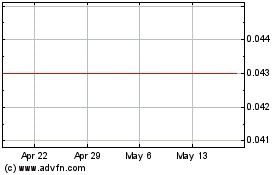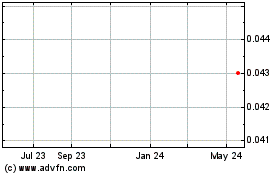Asian Shares Fall on Lower Oil, Fed Comments
December 02 2015 - 8:54PM
Dow Jones News
By Chao Deng
Asian shares fell after oil prices reached fresh lows overnight
and expectations firmed that the Federal Reserve will raise rates
after its December meeting in two weeks.
Australia's S&P/ASX 200 fell 0.6%, South Korea's Kospi fell
1.2% and Japan's Nikkei Stock Average was roughly flat.
Both factors are outweighing prospects of additional stimulus
from the European Central Bank, which meets later Thursday.
Economists and market watchers expect the central bank to reduce
their deposit rate further into negative territory and add to their
EUR60 billion ($63.5 billion) a month bond-buying program.
Gauges of materials and energy shares in Australia both fell
roughly 1.4%. Miners BHP Billiton Ltd. and Rio Tinto Ltd. fell 1.9%
and 2.1%, respectively. Woodside Petroleum Ltd. fell 2.2% and
Liquefied Natural Gas Ltd. fell 1.1%.
Oil and energy stocks could continue to swing ahead of Friday's
meeting of the Organization of the Petroleum Exporting Countries,
which is expected to be one of the most contentious in years. The
group decided last year not to cut output in a bid to defend, and
win, market share against increased competition from the U.S., a
policy that accelerated a price rout in oil.
U.S. crude oil dropped below $40 a barrel for the first time
since August on Wednesday, as a buildup of supplies signaled a
deepening global glut. Prices ended 4.6% lower on the New York
Mercantile Exchange, the largest one-day percentage decline since
Oct. 12.
Brent crude fell to a six-year low on Wednesday. The global
benchmark declined $1.95, or 4.4%, to $42.49 a barrel on ICE
Futures Europe, but gained 0.6% to $42.75 in Asia Thursday.
Meanwhile, the dollar rose after comments from Federal Reserve
Chairwoman Janet Yellen that the U.S. economy appeared to be
strengthening, a signal the central bank would raise rates soon, as
expected. Going forward, market participants will assess U.S.
nonfarm payroll data on Friday, which could offer further
indications of the Fed's timeline for raising short-term interest
rates.
The Wall Street Journal Dollar Index, which gauges the dollar
against a basket of 16 currencies, was last up 0.1% at $90.76 in
the U.S. on Wednesday in New York after rising as high as 91.02,
its strongest level since December 2002.
Higher interest rates in the U.S. would raise borrowing costs
and threatens to curtail a broad rally in global stocks during an
era of ultralow rates.
A strengthening dollar also pressured copper and other base
metals, which are priced in the currency. These assets typically
become more expensive to buy for other currency holders when the
dollar strengthens
Copper futures settled down 1.9% at $2.033 a pound on the Comex
division of the New York Mercantile Exchange. Among the other base
metals, aluminum was flat at $1,442 a ton, zinc was down 0.9% at
$1,531 a ton and nickel was up 1.2% at $8,440 a ton.
In currencies, the Australian dollar was down 0.1% at $0.7296.
The local currency reached its highest in 1 1/2 months on Wednesday
at $0.7342.
Gold prices fell 0.3% to $1,050.70 a troy ounce in Asia trade
Thursday.
Write to Chao Deng at Chao.Deng@wsj.com
(END) Dow Jones Newswires
December 02, 2015 20:39 ET (01:39 GMT)
Copyright (c) 2015 Dow Jones & Company, Inc.
Liquefied Natural Gas (ASX:LNG)
Historical Stock Chart
From Dec 2024 to Jan 2025

Liquefied Natural Gas (ASX:LNG)
Historical Stock Chart
From Jan 2024 to Jan 2025
